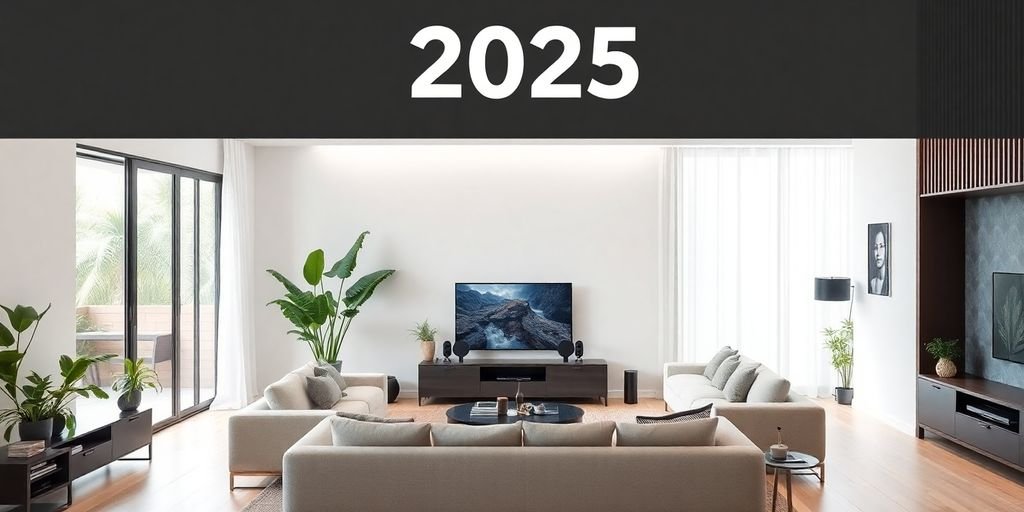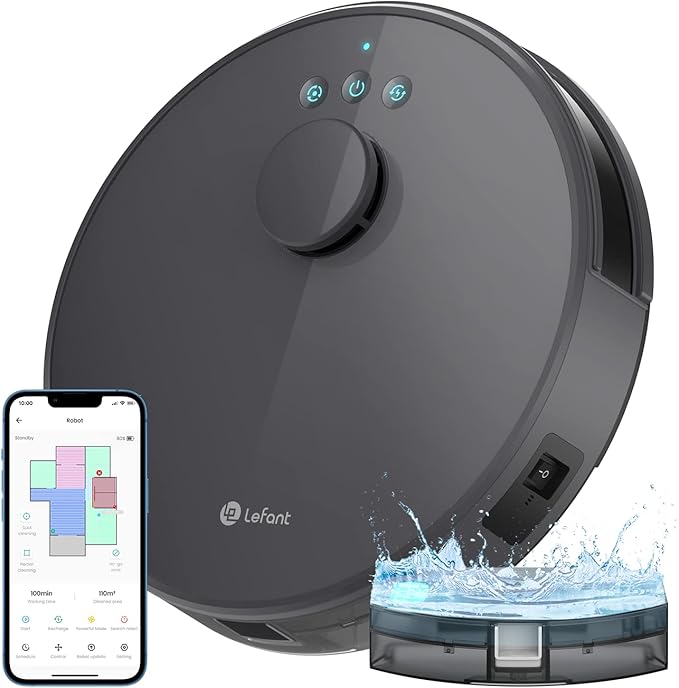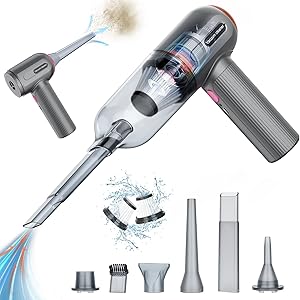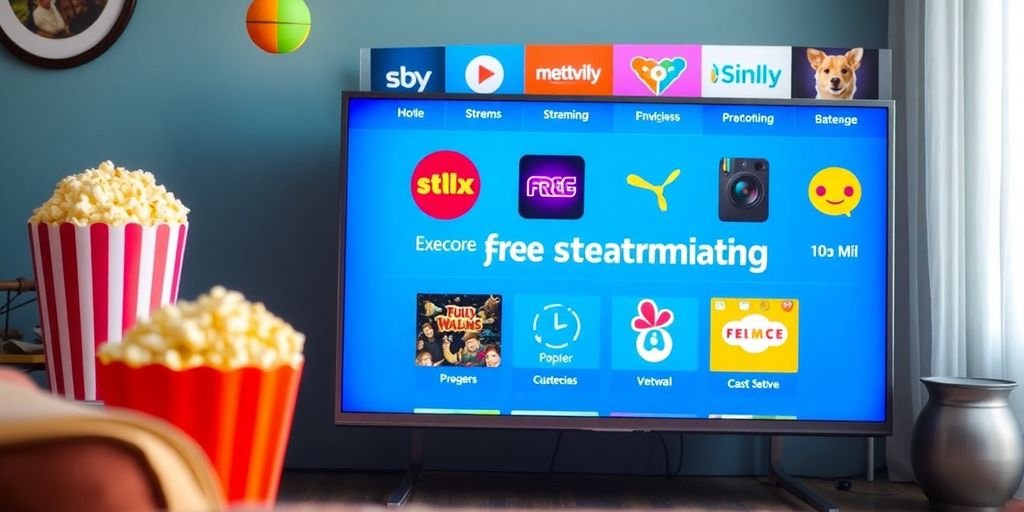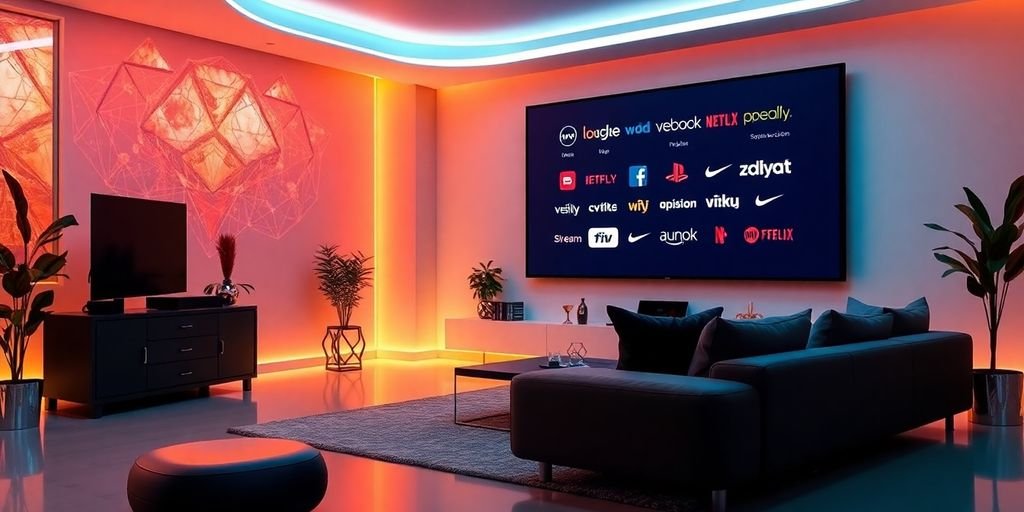As we look ahead to 2025, the concept of smart living is rapidly evolving. It’s not just about having the latest gadgets; it’s about creating a home that enhances our lives while being kind to the planet. From eco-friendly innovations to advanced automation, there are numerous smart living ideas that can transform your home into a more efficient, comfortable, and secure space. Let’s explore some of the most exciting trends and technologies that will shape our living environments in the near future.
Key Takeaways
- Sustainability is becoming a priority with eco-friendly designs and energy-efficient appliances.
- Smart home technology is now essential for enhancing security and convenience.
- Home automation makes daily tasks easier with voice control and automated systems.
- Health monitoring solutions are advancing, providing better safety and wellness tracking.
- Smart appliances are revolutionising kitchens, making them more efficient and user-friendly.
Prioritising Sustainability
Sustainability isn’t just a buzzword anymore; it’s a necessity. By 2025, expect to see it woven into the very fabric of our homes. It’s about making choices that benefit both us and the planet, and honestly, it’s about time. I mean, who wants to live in a house that’s actively harming the environment? Not me, that’s for sure.
Eco-Friendly Developments
These aren’t your grandma’s eco-houses. We’re talking about entire communities designed with the environment in mind. Think green spaces, shared resources, and buildings constructed with sustainable materials. It’s a move away from urban sprawl and towards thoughtful, integrated living. It’s not just about individual houses; it’s about creating a whole ecosystem that supports a greener lifestyle.
Energy-Efficient Appliances
Forget those energy-guzzling dinosaurs of the past. The appliances of 2025 are all about saving power. We’re talking smart fridges, washing machines, and ovens that use minimal energy without sacrificing performance. Plus, they’ll probably be able to tell you when you’re running low on milk. It’s a win-win, really.
Water Conservation Techniques
Water is precious, and we need to treat it that way. Expect to see more homes equipped with smart irrigation systems, low-flow toilets, and rainwater harvesting setups. It’s all about using water responsibly and reducing our impact on this vital resource. Plus, a lower water bill is always a nice bonus.
Implementing water conservation techniques isn’t just about saving money; it’s about preserving a resource that’s essential for life. It’s a small change that can make a big difference, and it’s something we should all be striving for.
Smart Home Trends in 2025
Smart home tech is becoming increasingly integrated into our lives, influencing how we live and purchase homes. These gadgets aren’t just fancy extras; they’re becoming a key factor for buyers and sellers alike. It’s all about making life easier through effortless control.
Saving Money, One Smart Device at a Time
Smart devices aren’t just about convenience; they’re also about saving money. From smart thermostats to energy-efficient appliances, these devices help reduce energy consumption and lower utility bills. Think about it:
- Smart thermostats learn your habits and adjust the temperature accordingly.
- Smart lighting systems automatically turn off lights when a room is empty.
- Energy-efficient appliances use less power, saving you money in the long run.
By 2025, expect even more sophisticated energy-saving features that will further reduce your carbon footprint and save you money. It’s a win-win for your wallet and the planet.
Enhanced Security Features
Home security is getting a serious upgrade. We’re talking advanced surveillance systems, smart locks, and even AI-powered security that can detect suspicious activity.
- Facial recognition technology will identify who’s at your door.
- Smart locks will allow you to remotely lock and unlock your doors.
- Real-time alerts will notify you of any potential threats.
These features are designed to give you peace of mind, knowing your home is safe and secure. Consider advanced security systems for your home.
Integration of AI in Home Management
AI is set to become the brain of your home, managing everything from lighting and temperature to security and entertainment. Imagine a home that anticipates your needs and adjusts accordingly.
- AI-powered assistants will respond to your voice commands.
- Machine learning algorithms will optimise energy consumption.
- Predictive maintenance will alert you to potential problems before they occur.
AI will make your home more efficient, comfortable, and secure. It’s about creating a truly responsive environment that caters to your needs.
Home Automation Innovations
Home automation is really taking off, and by 2025, it’s less about fancy gadgets and more about making life genuinely easier. We’re talking about systems that learn your habits and adapt to your needs, not just remote-controlled lights. It’s about creating a home that anticipates your needs.
Voice-Activated Control
Voice control is becoming more sophisticated. It’s not just about turning on the lights; it’s about having a conversation with your home. Imagine telling your house you’re cold, and it adjusts the heating in that specific room. Voice assistants are getting better at understanding context, so you don’t have to use precise commands. It’s more natural, more intuitive. You can even set up custom routines, so saying "goodnight" dims the lights, locks the doors, and sets the alarm.
Smart Lighting Automation
Smart lighting is evolving beyond simple dimming. It’s about creating moods and atmospheres automatically. Think about lights that adjust their colour temperature throughout the day to match your circadian rhythm, helping you wake up naturally and wind down in the evening. Or lights that brighten automatically when you enter a room and dim when you leave. Smart night light are also becoming more sophisticated, offering gentle illumination without disrupting sleep.
Automated Security Systems
Automated security is getting smarter, too. It’s not just about alarms; it’s about proactive protection. Facial recognition cameras can identify visitors and alert you to suspicious activity. Smart locks can grant temporary access to guests or service providers. And if a break-in is detected, the system can automatically alert the authorities and lock down the house. It gives you peace of mind whether you’re at work or on vacation. These home automations are worth considering.
The best part? These systems are becoming more affordable and easier to install. You don’t need to be a tech expert to set up a smart home. There are plenty of user-friendly options available, and many devices are designed to work together seamlessly. It’s all about creating a home that’s both smart and simple to use.
Health Monitoring Solutions
It’s amazing how much our homes can now contribute to our well-being. Forget just fitness trackers; our living spaces are becoming proactive partners in health. In 2025, expect even more integration of technology that keeps a close eye on your health, right from the comfort of your home.
Wearable Health Trackers
Wearable tech is nothing new, but its integration with smart homes is getting smarter. Imagine your fitness tracker automatically adjusting your home’s lighting to promote better sleep after a strenuous workout, or your smart mirror displaying your vital stats each morning. These devices will seamlessly communicate with your home environment, creating a personalised wellness ecosystem. It’s all about preventative care and making informed decisions about your health.
Environmental Sensors
These sensors are becoming increasingly important. They monitor everything from air quality to humidity levels, alerting you to potential hazards like mould or high levels of pollutants. This is especially useful for those with allergies or respiratory conditions.
- Air quality monitoring for pollutants and allergens.
- Humidity sensors to prevent mould growth.
- Carbon monoxide detectors for safety.
These sensors can also be linked to your smart ventilation system, automatically adjusting airflow to maintain optimal conditions. It’s about creating a healthier and more comfortable living environment.
Emergency Alert Systems
These systems are designed to provide peace of mind, especially for elderly or vulnerable individuals. They can detect falls, sudden changes in activity, or even unusual patterns in vital signs, automatically alerting emergency services or designated contacts. The ExpertSecure™ System is a great example of this.
- Fall detection technology.
- Panic buttons for immediate assistance.
- Integration with medical alert services.
Smart Appliances Revolution

Smart appliances are no longer a luxury; they’re becoming a standard feature in modern homes. By 2025, expect them to be even more integrated and intuitive, taking over many of the mundane tasks we all hate. Think less chore, more ‘hands-off’ convenience.
Interconnected Kitchen Devices
Imagine a kitchen where your fridge communicates with your oven, and your shopping list updates automatically. This interconnectedness is the future. Smart fridges will not only track expiration dates but also suggest recipes based on what you have available. Ovens will preheat automatically based on your schedule, and dishwashers will optimise their cycles for maximum efficiency. It’s all about creating a seamless cooking experience. I can’t wait for smart furniture to be a thing.
Resource Optimisation
One of the biggest advantages of smart appliances is their ability to optimise resource usage. Washing machines will use only the necessary amount of water and energy, dishwashers will adjust their cycles based on the load, and ovens will minimise preheating time. This not only saves you money but also reduces your environmental impact. It’s a win-win situation. I’m looking forward to effortless control of my appliances.
User-Friendly Management
Gone are the days of complicated manuals and confusing interfaces. Smart appliances in 2025 will be incredibly user-friendly, with intuitive apps and voice control options. You’ll be able to monitor and manage all your appliances from your smartphone, adjusting settings, scheduling tasks, and receiving alerts. It’s all about putting you in control, without the hassle.
The best part? These appliances will learn your habits and preferences over time, adapting to your needs and making your life even easier. No more fiddling with settings every time you use the washing machine – it’ll just know what you want. It’s like having a personal assistant for your home.
Here’s a quick look at how smart appliances can save you time and resources:
- Automated cooking programmes
- Remote monitoring and control
- Predictive maintenance alerts
Intelligent Energy Management

Energy management is getting a whole lot smarter, and by 2025, it’ll be a game-changer for how we use power at home. It’s not just about saving a few quid on your bill; it’s about making our homes more sustainable and reducing our impact on the planet. Think of it as your home becoming an energy-saving expert, without you having to lift a finger.
Smart Thermostats
Smart thermostats are already pretty common, but they’re getting even better. They learn your routines, understand when you’re home or away, and adjust the temperature accordingly. Some can even predict when you’ll need the heating on based on the weather forecast. Plus, they can be controlled remotely via your phone, so you can tweak the temperature on your way home. It’s all about comfort and efficiency.
Energy Usage Monitoring
Knowing where your energy is going is half the battle. New systems will provide detailed breakdowns of your energy consumption, showing you exactly which appliances are guzzling the most power. This data helps you make informed decisions about reducing energy consumption, like replacing old appliances or adjusting your usage habits. It’s like having a personal energy advisor built into your home.
Automated Power Management
Imagine a system that automatically switches off lights in empty rooms, or puts appliances into standby mode when they’re not in use. That’s the power of automated power management. These systems use sensors and smart plugs to optimise energy usage throughout your home. It’s a simple way to achieve significant advancements in energy efficiency without any effort on your part.
Investing in intelligent energy management isn’t just about saving money; it’s about creating a more sustainable future. By embracing these technologies, we can reduce our carbon footprint and make our homes more environmentally friendly. It’s a win-win for both our wallets and the planet.
Transformative Home Design
Home design is about to get a serious upgrade. We’re not just talking about a fresh coat of paint; we’re talking about spaces that adapt to your needs, furniture that thinks for itself, and rooms that can change shape at the touch of a button. It’s all about making your home work smarter, not harder.
Adaptive Living Spaces
Imagine a living room that transforms into a home cinema in the evening, or a dining area that expands to accommodate unexpected guests. Adaptive living spaces are all about flexibility and making the most of the space you have. Think modular walls, hidden storage, and furniture that can be easily reconfigured. It’s about creating a home that can keep up with your ever-changing lifestyle. This is more than just decor updates; it’s a fundamental shift in how we think about home design.
Smart Furniture Solutions
Your furniture is about to get a whole lot smarter. We’re talking about beds that adjust to your sleeping position, tables that charge your devices wirelessly, and sofas that can monitor your posture. Smart furniture isn’t just about convenience; it’s about creating a healthier and more comfortable living environment.
Here are some examples:
- Beds with sleep tracking and automatic adjustment.
- Tables with built-in wireless charging and ambient lighting.
- Sofas with posture monitoring and massage functions.
Flexible Room Configurations
Say goodbye to fixed layouts and hello to rooms that can adapt to your needs. Flexible room configurations are all about creating spaces that can be easily transformed. Think sliding walls, folding doors, and modular furniture that can be rearranged to create different zones within a room. It’s about creating a home that can adapt to your lifestyle, whether you’re working from home, entertaining guests, or just relaxing with family.
The key to transformative home design is to think beyond the traditional. It’s about embracing innovation and creating a home that is both functional and beautiful. It’s about creating a space that reflects your personality and enhances your quality of life.
Embracing the Future of Smart Living
As we wrap up our look at smart living ideas for 2025, it’s clear that the future is all about making our homes work for us. The tech we’ve discussed isn’t just about fancy gadgets; it’s about creating spaces that are more comfortable, efficient, and secure. Whether you’re keen on saving energy, boosting your home’s security, or simply making life a bit easier, there’s something here for everyone. Sure, some of these upgrades might take a bit of time and investment, but the payoff in convenience and peace of mind is well worth it. So, why not start small? Pick one or two ideas that resonate with you and see how they can transform your living space. The journey to a smarter home is just beginning, and it’s an exciting one!
Frequently Asked Questions
What are smart homes?
Smart homes are houses that use technology to make everyday tasks easier, like controlling lights and appliances with your voice or phone.
How can I make my home more eco-friendly?
You can use energy-efficient appliances, smart thermostats, and water-saving devices to help reduce your environmental impact.
What are the benefits of smart home technology?
Smart home technology can save you money, improve security, and make your life more comfortable by automating tasks.
Are smart home devices easy to use?
Yes, most smart home devices are designed to be user-friendly, often controlled through apps on your smartphone.
What is a smart thermostat?
A smart thermostat is a device that learns your heating and cooling preferences and adjusts the temperature automatically to save energy.
How do health monitoring systems work in smart homes?
Health monitoring systems use devices like wearables and sensors to track health data, helping you stay informed about your well-being.

